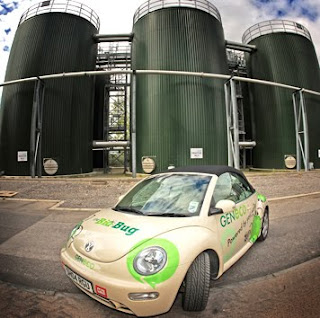
The most recent breakthrough in the drive to encourage sustainable power in cars hasn’t come from the usual Prius or Hybrid, but from a Water company in Bristol. The testing of the new poo powered car has caused quite a stir with the locals, as its being powered by methane from the local sewerage treatment plant.
GENeco, part of Wessex Water, is behind the concept and their experts reckon that the waste flushed down the toilets of 70 homes is enough to power the car for a year. The car still produces C02 (3 tonnes compared to the average cars 3.5 tonnes) but it’s basically carbon neutral as all the C02 would have been released into the atmosphere anyway, in the form of methane.
It’s a clever sustainable idea for utilising the waste product of treating sewerage. In fact, the plant in Bristol produces enough of the stuff to power 9540 of these cars each year. The Dung Beetle is currently only being tested, however if successful, GENeco plans to convert its whole fleet of cars to run on the waste that they treat at their plant.
It’s obviously a great marketing ploy for the company, the tag line ‘powered by your waste!’ quickly connects consumers to the car but the concept behind it really is a right foot forward for businesses who want to become more sustainable. Taking the nasty by-product of its operations and turning it into a carbon neutral fuel, GENeco have created a platform for companies to really start thinking about how they can utilise waste. I am sure other companies will follow suit; Supermarkets could use leftover rotten vegetables to power their home delivery services or pampers could even design a nappy bin that powers a nightlight.
The world is full of ways that companies can take what appears to be waste and turn it into something positive, and who would have thought, that it would be a car powered by poo that led the way!

